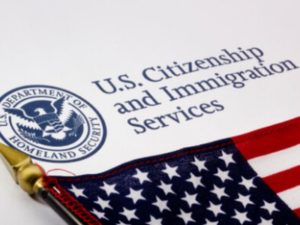A K-3 visa is a non-immigrant visa issued to a foreign spouse married to a U.S. citizen. Like a K-1 visa, a K-3 visa is also filed using a Form I-129F Petition for Alien Fiancé(e) (“Form I-129F Petition”) intended to shorten the separation period between the married couple and allow the foreign spouse to enter the United States while awaiting approval of his or her immigrant visa. However, unlike a CR-1/ IR-1 immigrant visa in which the foreign spouse would arrive in the United States as an immigrant and be granted conditional permanent resident status and a conditional “Green Card” after arrival, a K-3 visa requires the foreign spouse to first arrive in the United States and then file for Adjustment of Status (“AOS”) as well as work authorization and a travel document. Once AOS is granted, the foreign spouse would be issued a Green Card giving them the same benefits as a foreign spouse who arrived in the United States as an immigrant by applying for a CR-1/ IR-1 immigrant visa.
What are some of the requirements for a K-3 Visa?
In order to be eligible for a K-3 visa, the foreign spouse and U.S. citizen must be legally married and first file a Form I-130 Petition for Alien Relative (“Form I-130 Petition”) with the United States Citizenship and Immigration Services (“USCIS”). Upon receiving a receipt notice from USCIS, a Form I-129F Petition is filed. If USCIS approves the Form I-129F Petition before the Form I-130 Petition, the K-3 visa applicant (and step-children under a K-4 visa) would then file a DS-160 Online Nonimmigrant Visa Application. Following medical clearance, the spouse and children would undergo a visa interview at a U.S. Embassy or Consulate before being issued a K-3 (and K-4 visa).
Is a K-3 Visa an alternative to a CR-1/ IR-1 Immigrant Visa?
While there is no harm in applying for a K-3 visa and pursuing a CR-1/ IR-1 immigrant visa at the same time, applicants should take into consideration that the Form I-130 Petition may be approved before the Form I-129F Petition is approved, and if that occurs, the Form I-129F Petition will be canceled. Once the spouse enters the U.S., he or she becomes a permanent resident and will receive the Green Card shortly thereafter. There is no need to apply for work or travel authorization. In addition, while the CR-1/ IR-1 is an immigrant visa process and might take a little longer, the visa application fees are less than the fees for the AOS process. Finally, in the long run, AOS applications usually take considerable time to complete because of backlogs with USCIS inside the United States and the spouse would be required to apply for work and travel authorization. Because of these difference, we often do not recommend a spouse to file the Form I-129F Petition and is something that a sponsoring spouse should carefully consider based on his or her situation.
For more information, contact us today at info@enterlnepartners.com and speak with a U.S. immigration attorney based in Ho Chi Minh City, Manila and Taipei.
ENTERLINE & PARTNERS CONSULTING
Ho Chi Minh City, Vietnam Office
Suite 601, 6th Floor, Saigon Tower
29 Le Duan Street
Ben Nghe Ward, District 1
Ho Chi Minh City, Vietnam
Tel: +84 933 301 488
Email: info@enterlinepartners.com
Facebook: Enterline & Partners – Dịch vụ Thị thực và Định cư Hoa Kỳ
Website: http://enterlinepartners.com
Manila, Philippines Office
Tel: +632 5310 1491
Email: info@enterlinepartners.com
Facebook: Enterline and Partners Philippines
Website: https://enterlinepartners.com/language/en/welcome/
Copyright 2022. This article is for information purposes only and does not constitute legal advice. This article may be changed with or without notice. The opinions expressed in this article are those of Enterline and Partners only.




